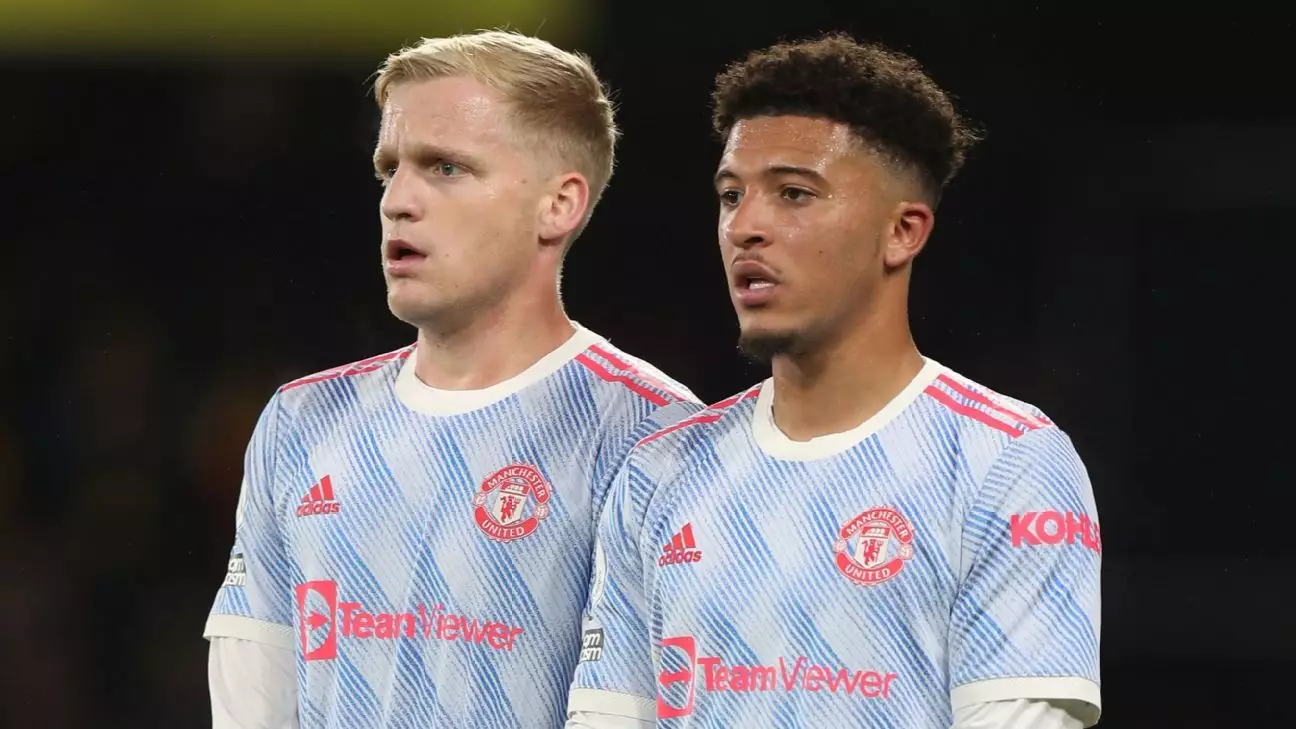The transfer window at Manchester United has been nothing short of disappointing, leaving new minority shareholder Sir Jim Ratcliffe with valuable insights into the necessary changes at Old Trafford. As high-profile players worth over £100 million have exited the club in search of greener pastures, questions arise as to whether the blame lies with the players themselves or the club’s mismanagement. This critical analysis delves into the intricacies of Manchester United’s transfer strategy and the potential factors underlying their recent failures.
Donny van de Beek’s move to Manchester United in 2020 for £40 million and Jadon Sancho’s arrival in 2021 for a whopping £73 million seemed like promising signings. However, both players have now left the club on loan deals, raising concerns about the club’s ability to utilize and develop talent effectively. Were Van de Beek and Sancho fundamentally doomed to fail from the beginning, or did Manchester United contribute to their decline? This lingering question poses challenges to Ratcliffe and his team as they seek to rectify the club’s transfer woes.
To highlight the unpredictability of player development, we can examine the hypothetical scenarios that could have influenced young talents’ careers. Jude Bellingham, for instance, had the opportunity to join Manchester United and Borussia Dortmund in 2020. He ultimately chose Dortmund and, after three and a half years, he has become a standout player at Real Madrid and was even included in FIFA’s World XI. This counterfactual situation provokes reflections on the potential influence of clubs on players’ trajectories.
Even renowned Manchester United loyalist Gary Neville has begun to question the club’s appeal and its ability to nurture talent. Neville admitted that his previous declarations of the club’s magic may have been misguided, as players like Bellingham have flourished elsewhere. This introspection leads to an examination of the club’s culture and its potential role in hindering player success. It becomes apparent that the issue at hand extends beyond solely blaming players for their underwhelming performances.
Assessing the club’s ten most expensive signings demonstrates the scarcity of success. While Bruno Fernandes stands out as a relatively triumphant acquisition, the jury is still out on players like Rasmus Hojlund, Mason Mount, and Casemiro. However, the rest, including the likes of Paul Pogba, Antony, Harry Maguire, Sancho, Romelu Lukaku, and Ángel Di María, all fall into the category of expensive mistakes. This alarming trend over the past decade raises significant doubts about the club’s recruitment strategies and its aptitude for maximizing the potential of high-value signings.
Manchester United’s challenging environment has been cited as a crucial factor in determining player success. Manager Erik ten Hag believes that the intense pressure players face at the club ultimately depends on their character and confidence. His statement suggests that Manchester United’s high-pressure atmosphere may present challenges that only certain players can overcome. Similarly, Dortmund manager Edin Terzic acknowledges the weight of playing for Manchester United and how it can affect young players like Sancho. The pressure that comes with wearing the iconic United shirt has the potential to hinder their performance.
However, the positive experiences of recent youth signings at other clubs cast doubt on the notion that Manchester United’s environment is inherently detrimental. Bellingham’s seamless integration at Real Madrid and Erling Haaland’s success at Manchester City following their respective departures from Dortmund contradict the argument that the United pressure stifles player growth. This contradiction forces a reexamination of the factors that contribute to a player’s development and success.
Considerations about alternative choices and paths add further complexity to the analysis. What if Van de Beek and Sancho had opted for different clubs or geographical locations? The potential impact of such choices is exemplified by the success of Rúben Dias at Manchester City, a player both United and City pursued. Dias has thrived under Pep Guardiola’s leadership, enjoying a successful spell at the club. These contrasting outcomes raise questions about how different environments and alternative pathways could have influenced the careers of players who struggled at Manchester United.
When the new shareholders assume decision-making authority, they are faced with a daunting task. Rectifying the club’s recruitment strategies is paramount for their success. The identification and acquisition of players must undergo substantial changes. Furthermore, emphasis must be placed on creating an environment that fosters player growth and development. Van de Beek and Sancho serve as cautionary tales of bright futures extinguished at Manchester United, underscoring the urgency for the new shareholders led by Sir Jim Ratcliffe to thoroughly examine the root causes of these failures.
Manchester United’s recent transfer window disappointments reflect a broader issue that extends beyond the realm of individual players. While player character and the pressures of playing for the club may contribute to underperformance, the successes of other players in similar environments demonstrate the complexity of player development. As Sir Jim Ratcliffe takes on his new role as a minority shareholder, the club must critically assess its recruitment processes and the culture it creates. Only then can Manchester United hope to regain its former glory and avoid repeating the mistakes that have plagued their recent transfer endeavors.
